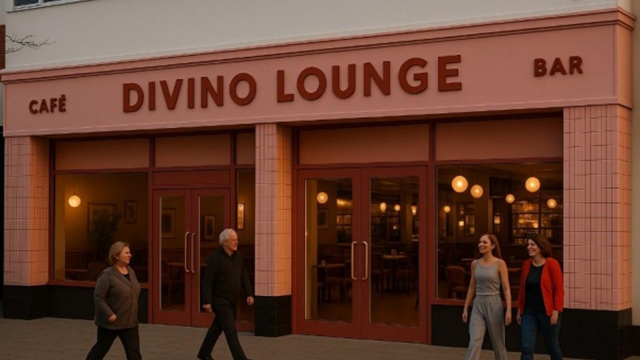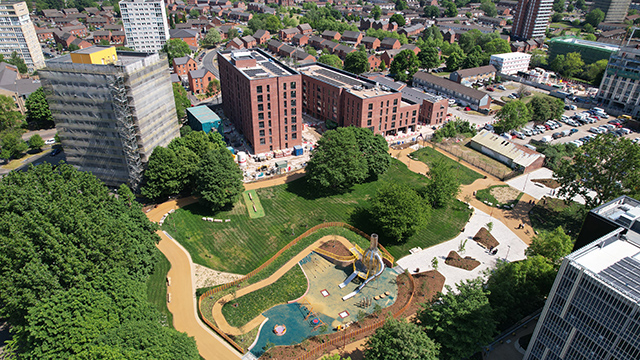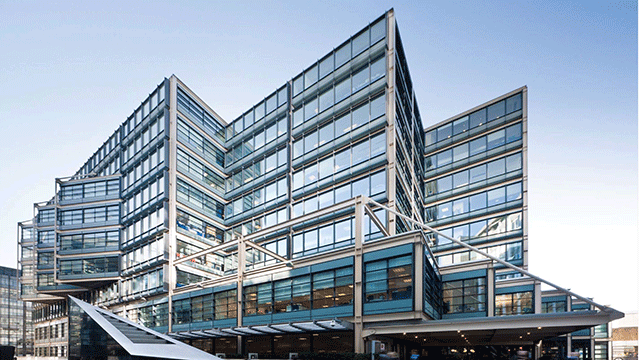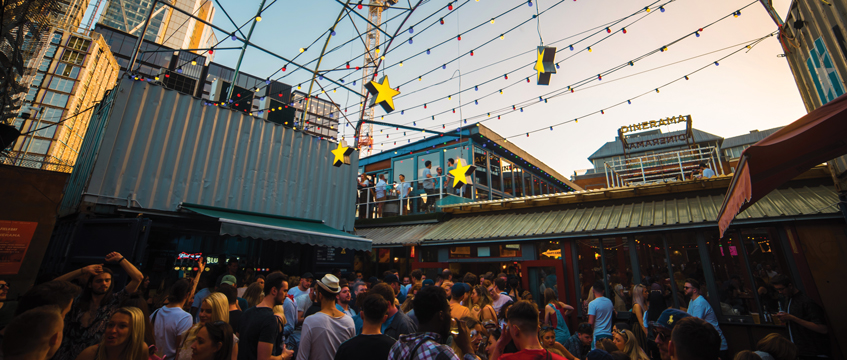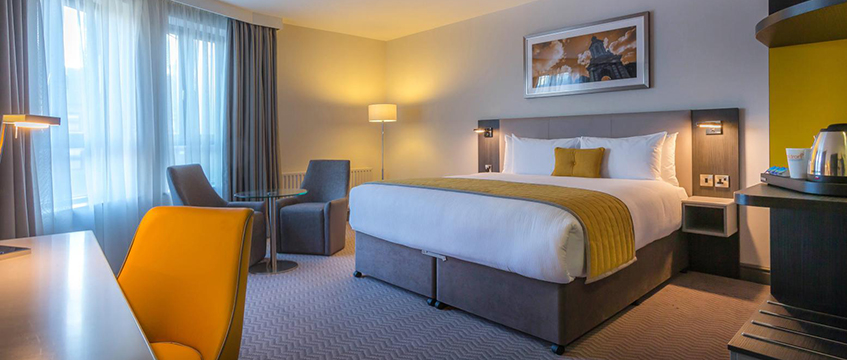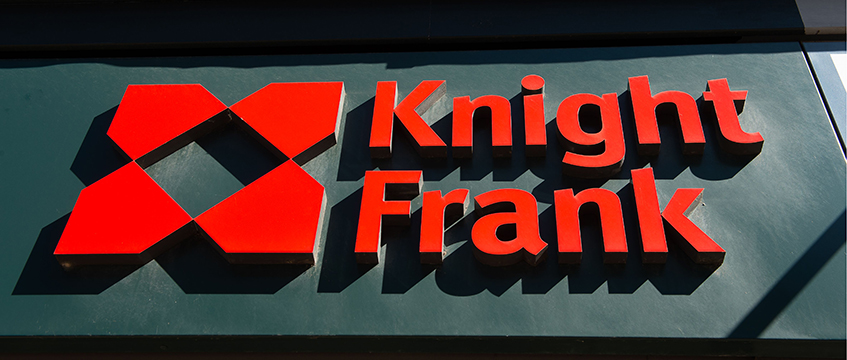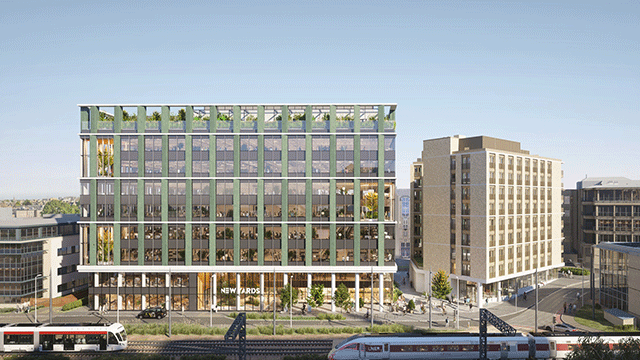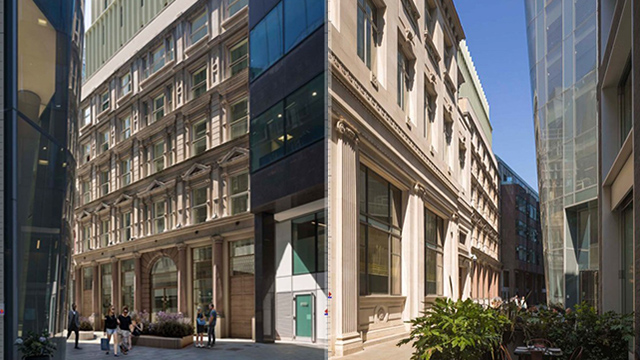Spend a Friday or Saturday evening at one of London Union’s street food markets, and you will be hard-pressed to find many fed-up faces. In sites converted from locations such as a derelict 1950s market and an old bullion truck yard, visitors tuck into Thai fried chicken, Taiwanese steamed buns and enormous burgers from independent traders, all while drinks flow and DJs provide the soundtrack. But Jonathan “JD” Downey, the man behind London Union and its Street Feast markets, is frustrated.
Frustrated that oppressive licensing regimes are stymying the ability of businesses like his to grow across large parts of the capital. Frustrated that the jobs that could be created, and the other benefits from a thriving night-time economy, will go elsewhere. And frustrated that the property industry seems to have little interest in the problem.
“We’ve only really been able to open one site in central London – that’s Dinerama in Shoreditch,” says Downey in an interview at London Union’s offices, also in Shoreditch. “That’s ridiculous. We are well-funded, vastly experienced, desperate to grow. And we’re forced to open on trading estates 15 minutes’ walk from Wood Green station, in abandoned derelict market buildings in Woolwich [both sites now closed]. We’re not being given any opportunities to create world-class destination venues for local Londoners and for visitors to London.”
Much of Downey’s ire is directed at his own backyard. A long-time Hackney resident who has raised four children in the borough, Downey has railed against restrictive licensing laws introduced last year, under which venues applying for a new licence are unable to open past 11pm on a weekday and midnight on Fridays and Saturdays – with most outdoor events closing at 10pm.
He describes the new rules, which he notes the council approved despite most local residents opposing them, as “absolutely disastrous” for anyone attempting to open a new night-time business in the area.
“[Rival street food market] Boxpark has got an 11 o’clock licence on a Friday and Saturday [in Shoreditch],” Downey says. “I mean Jesus Christ – that is [like the] first world war, ‘get the men home because they’re in the munitions factory in the morning and we don’t want them drunk or hungover’.”
Blanket ban
Downey is hopeful that he might strike a deal for another Street Feast market in London, most likely in the West End. But there too, restrictive licensing policies mean he will need to team with a landlord that already has a licence, so that part of the city may also be out of reach for London Union.
“This is a blanket ban,” says Downey, a former lawyer who earlier in his career co-founded Soho members club Milk & Honey, and has set up several other bars. “This is a total and complete curfew [across] huge areas of the West End, a massive part of Hackney and Shoreditch – double the size of last year – and also in Dalston.”
London loses more than just the economic benefits when launching a new business is made so difficult, Downey says. It also loses the excitement and sense of community that comes with a vibrant and changing night-time scene. “We just miss ‘new’,” he says. “We miss change. We miss the next thing. We miss interesting.”
Downey says that he has “given up on Hackney completely” as a location for his food markets. A vacant local railway arches site near his office would have been perfect for a Street Feast outlet, he says, but the new licensing rules mean he won’t make an offer to take the site on. The London Union boss is already predicting what will happen when another business moves into it.
“Somebody will probably do something with it and try to struggle by with the 11 o’clock and 12 o’clock [licence] on a Friday or Saturday,” he says. “They’ll never make enough money. It will deteriorate. The head chef will leave it. Staff will be unhappy. It’ll struggle on for a year or two.”
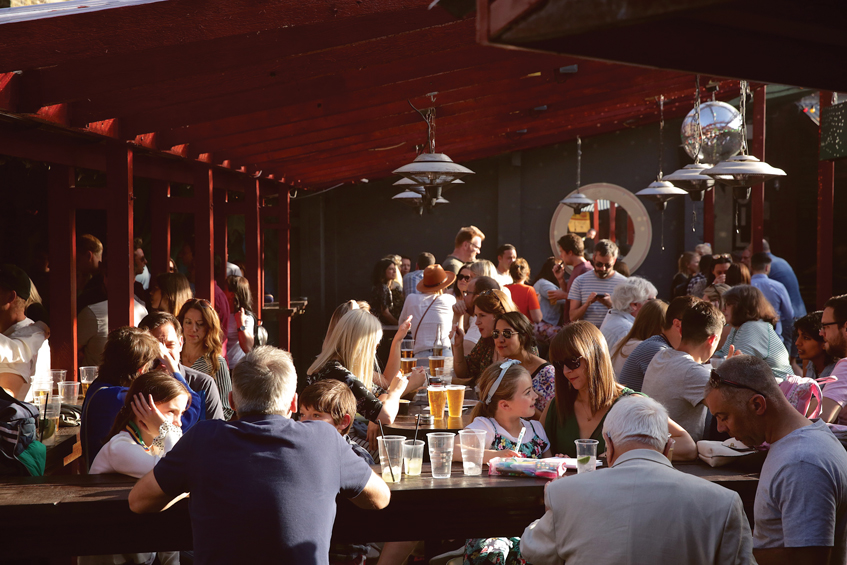
Reasons to be fearful
Downey admits that as a businessman with an existing venture and licences already agreed, he should be happy that the new licensing policy has raised the barrier to entry for his competitors.
“No one can open another Dinerama, so our interests are best served by this,” he says. “But I’m pissed off because I live in Hackney, I love Hackney, and I want to see it grow and change and develop.”
And so Downey has thrown his weight behind We Love Hackney, a residents group arguing that the licensing changes are “a gift to big corporates”, which will force up the value of a licence and ultimately make the borough “sterile and soulless” as big brands shoulder out more entrepreneurial ventures. Downey calls it “Leicester Squarification of Shoreditch”.
But getting the council involved in a discussion about the new regime has proved difficult. The residents group brought a judicial review against the licensing restrictions, but withdrew it after a request to cap costs was rejected. Downey is now left with only some unorthodox suggestions for addressing the problem (“We’ve got to kill all the politicians that are responsible,” he deadpans before a laugh. “Targeted strikes, assassinations. It’s the only way.”).
It is here that his disillusionment with the property industry comes in. “The lack of concern in response to what’s happening with the new licensing policy from landlords and developers is astonishing,” he says.
“They are going to suffer more than anybody. Residents will be alright. There’s always somewhere you can go to eat and drink. Existing business owners will be alright, they’ve got their licences. But if you’re opening, if you’re building, if you’re developing medium and large projects in Hackney right now, you’re not going to be able to get anything on the ground floor that’s going to work in the long term because the licensing environment will not allow it.”
Developers “should be scared of this”, Downey adds. “They should be worried by this. They should be responding to this. They should be supporting the We Love Hackney campaign.”
A spokesperson for Hackney council tells EG: “We consider each new application based on its own merits. This policy ensures that new applicants demonstrate that they understand the pressures in each area and that their businesses will not have a negative impact on the area by opening later. Evidence suggests that the current policy, despite claims made last year, has not led to the death of nightlife in the borough, and that it has continued to thrive.”
Manchester-bound
London still excites Downey, particularly its restaurant scene. But the next chapter for London Union and the Street Feast markets will start 200 miles away, in his hometown.
Downey expects to open three sites in Manchester by the end of 2020, with two of those sites signed up within the next few months. The largest, in the city centre, should be open by next September and will be “epic”, Downey promises.
“We’re going to be investing millions of pounds in the economy in Manchester,” he says. “We’re probably going to create about 300 to 400 really good new jobs – great training, well-paid, brilliant experience, opportunities for rapid advancement and real good work-life balance – for mostly younger people.
“And we’re going to support dozens of new small businesses that want to trade with us. Businesses like [Street Feast tenants] Yum Bun and Smokestak and Breddos and Pizza Pilgrims and BOB’s Lobster and all these people that have gone on to grow to 10 sites or to two or three restaurants.”
Downey makes no suggestion that expanding the Street Feast network was ever an “either/or” decision between London and Manchester. But as he describes the struggles of opening a new business in the capital versus his discussions so far in Manchester, the push and pull factors become clear.
“I haven’t applied for a licence in Manchester yet, so I’ve got no experience, but everybody’s telling me it’s not gonna be a problem,” Downey says. “And you can just see from the venues I’ve looked at with licences already – they’ve got the hours they want. They haven’t got ridiculous conditions that are archaic or irrelevant.”
Add a can-do attitude that seems to be missing in the capital, Downey says, and getting three sites opened in Manchester in quick succession feels like it could be a breeze compared to dealings in London. “You speak to anybody in Manchester, whether they’re a landlord or a developer or work for local authority or an existing operator, the answer is ‘Yes, now let’s work out how we can do it,’” he adds. “Their instinct is ‘Let’s figure out how we can do that’. In large parts of London, the answer is ‘No, no way, never’.”
Downey’s company generated revenues of £12.5m last year, with earnings before interest, taxes, depreciation and amortisation rocketing from £70,000 in 2017 to £826,000. The founder’s goal is to double revenues to £25m in the UK and then to start expanding internationally, with several cities in the US on his radar. Whatever the licensing policies look like, London might not be the limit for London Union for much longer.
To send feedback, e-mail tim.burke@egi.co.uk or tweet @_tim_burke or @estatesgazette




